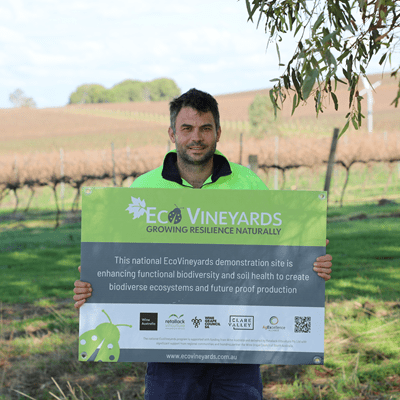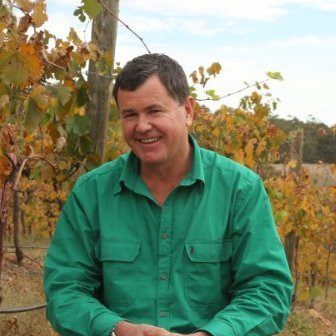
Vale Ben Mitchell
Ben Mitchell passed way in March 2024 after a short illness. He joined the EcoVineyards family as an EcoGrower for Taylors Wines in July 2022 and later moving on to work at Paulett Wines. Ben was a well-respected viticulturist from the Clare Valley, with a passion for reducing the use of synthetic pesticides, reducing our carbon footprint, and increasing vineyard biodiversity.
We extend our deepest sympathy to Ben’s family, his colleagues and all that knew and loved him. Ben will be missed by many and his contributions to the wine community will continue to be valued.
Here is what Ben had to say about the program at the start of 2023.
Tell us in a few sentences about your experience as a viticulturist, how did you arrive here?
Taylors Wines was established in 1969 in Auburn in the southern end of the Clare Valley, currently we farm 420 hectares of vineyard which is predominantly Shiraz and Cab Sav grape varieties.
Why did you decide to apply to be an EcoGrower, was there something specific that influenced your decision and/or had you attended a previous EcoVineyards session?
As a company we are dedicated to reducing the use of synthetic pesticides, reducing our carbon footprint, and increasing vineyard biodiversity.
Has there been a defining moment or catalyst for you to move towards more ecologically driven viticultural practices?
We have had an issue with Light Brown Apple Moth pest infecting grapes in a specific riesling block for many years. We would like to reduce the use of synthetic insecticides and rely more on beneficial insects such as trichogramma wasp to control the Light Brown Apple Moth.
Can you provide a brief overview of your project ideas, and what you wish to achieve over the 3 years and why is this important to you?
We would like to plant a native insectary adjacent and surrounding the riesling block.
In year one we are planting an area of 0.45ha with 400 native plants as a dedicated insectary to host beneficial insects and in year two, planting natives surrounding the block. We are hoping this will provide a more balanced ecosystem / food web such that no LBAM infection of grapes occurs.
Are you just starting to learn, or have you been enhancing biodiversity on your property and is this an extension of what you are currently doing? If so, please tell us more.
Just starting to learn.
Tell us about your hidden superpowers, something that others don’t know about you or a practice you would like to champion?
We would love to grow undervine ground covers such as medics and iron grass so that we don’t have to rely on herbicides to control weeds undervine.
Where do you see grape growing in the future, do you feel there is an urgency to change current practices? If so, why?
We need to stop using pre-emergent herbicides that sterilises our soil and stops the natural mycorrhizal fungi and rhizobium bacteria flourishing providing free nutrient cycling. Also, we need to stop using Synthetic nitrogen fertilisers that emit nitrous oxides which are detrimental greenhouse gases, and we need use more legumes ground covers to fix natural biological nitrogen in the soil.
What else would you like to share with the broader EcoVineyards community, what gets you excited about the future?
Both our vineyard and winery have been certified for Sustainable Winegrowing Australia accreditation since 2010.
I’m excited that the EcoVineyards program will increase the sustainability and the life span of the vineyard assets for future generations to come.

